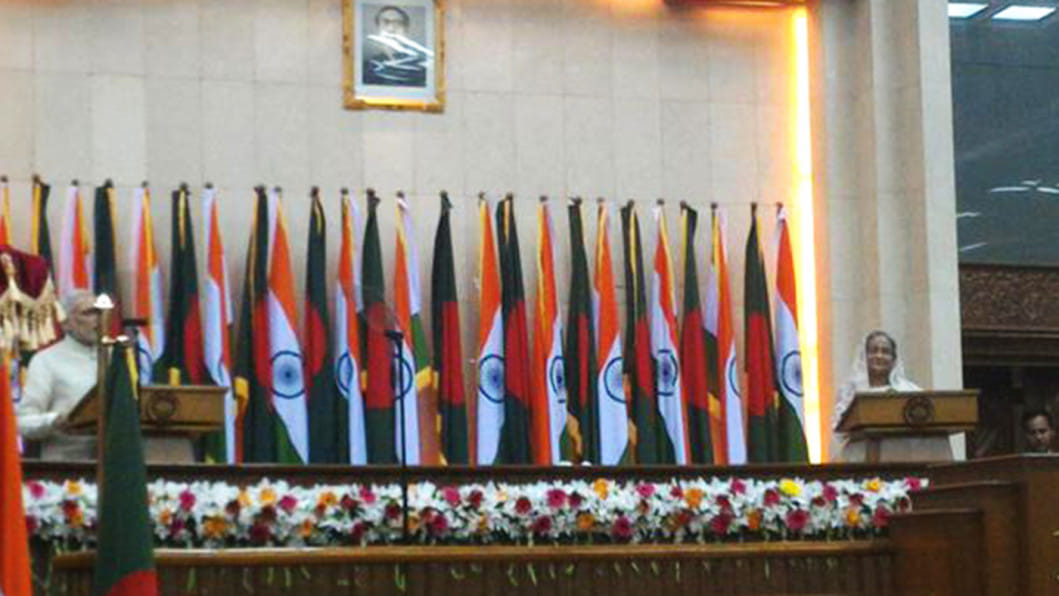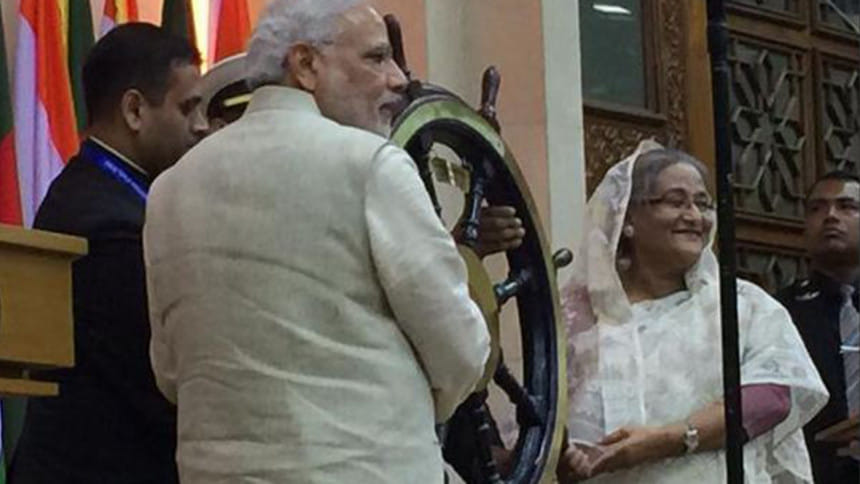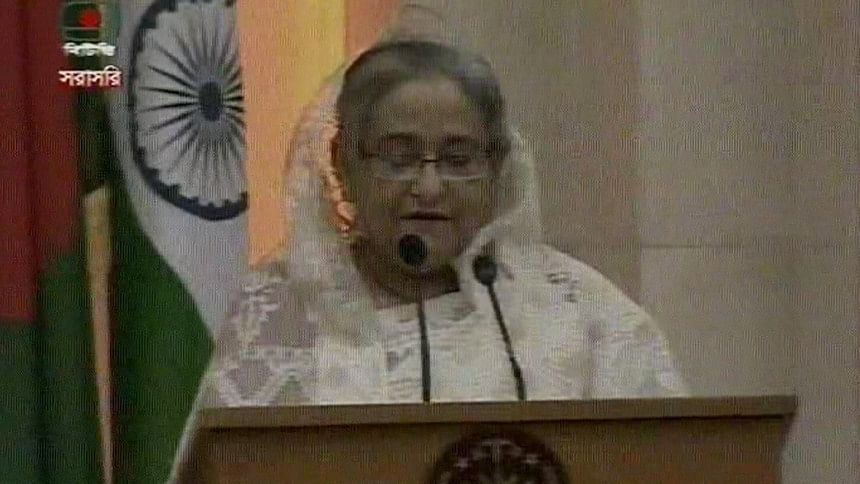Modi confident about fair solution on Teesta, Feni rivers

Indian Prime Minister Narendra Modi today expressed his confidence about reaching a fair solution on Teesta and Feni rivers with the support of his country's state governments.
He expressed his optimism regarding the much-debated issue at a joint press briefing with his Bangladesh counterpart Sheikh Hasina at the latter's office in the capital, Dhaka, on the first day of his maiden visit.
"I am confident that with the support of state governments in India, we can reach a fair solution on Teesta and Feni rivers. We should also work together to renew and clean our rivers," he said.
"Our rivers should nurture our relationship, not become a source of discord," Modi said. Water sharing is, above all, a human issue. It affects life and livelihood on both sides of the border, he added.
Saying that he is conscious of the huge trade imbalance despite duty free and quota free access to Bangladesh in India on all but 25 items, Modi said: "Yet, I have assured Prime Minister that we will do everything we can to bridge the deficit."
Indian investments in Bangladesh will help in this regard, he noted, assuring that he would try to make trade smoother and easier, including at the border.
"The agreement on standards and testing is a step in that direction.
Power supply from India to Bangladesh will grow from 500 MW to 1100 MW within two years. The 1320 MW Rampal power project is making progress in accordance with Bangladesh's laws and regulations, he said. "We can do more together in power sector, here and in India."
Pointing out renewal of existing trade and transport agreements and addition of new dimensions to the two countries' economic ties, Modi said: "The coastal shipping agreement will boost bilateral trade. The Indian Economic Zone will promote Indian investments in Bangladesh. The new border haat at Kamalasagar will reinforce traditional economic links. And, the agreement on blue economy and maritime cooperation opens a new area of economic opportunities."
"We should now extend our frontiers of cooperation to Space."
People in India admire Bangladesh's progress despite challenges and want Bangaldeshis to succeed in your Mission 2021 & 2041, he said.
As the two countries deepen their political engagement and celebrate rich inheritance, as their economies get more integrated and people better connected, the nations would become more prosperous, he said.
"It will also open new economic doors for India's Northeast. And, it will enable our two countries to integrate South Asia and connect it with the dynamic East."
Modi said the vision of South Asian Association for Regional Cooperation (Saarc) is a gift of Bangladesh.
Saying that he was deeply honoured and touched by "your special gestures for my visit", he said, "For me, there is the wonderful feeling of visiting a close neighbour."
He stressed the relationship between Bangladesh and India as of "great importance for us and our region" and said: "We are successful fellow travellers on the road to development. Our growing cooperation is a picture of my deeply held belief in the shared prosperity of neighbours. That is why the future I dream for India is the future I wish for Bangladesh."
"We stand at a moment of huge opportunity in our relationship. Prime Minister Hasina and I recognise that."
The agreements in a variety of different sectors would seek to harness the full potential of the relationship, he opined.
Regarding the 1974 Land Boundary Agreement, which India ratified recently, he said: "We have resolved a question that has lingered since Independence. Our two nations have a settled boundary. It will make our borders more secure and people's life there more stable."
The Indian parliament's approval of Land Boundary Agreement reflects the consensus in India on relations with Bangladesh, he pointed out.

"We accepted the settlement of the maritime boundary last year. It is evidence of the maturity of our ties and our shared commitment to international rules."
Bangladesh and India are not just neighbours but "nations bound by the threads of history, religion, culture, language and kinship & a passion 4 cricket", he said.
Stressing that connectivity is the catalyst for deeper engagement, the Indian premier said Bangladesh's decision to allow transit of power equipment and food-grain to the Northeast echoes "the strength of your human values and our shared economic opportunities".
"Connectivity by road, rail, rivers, sea, transmission lines, petroleum pipelines and digital links will increase. Today, we have unveiled some of the pathways to this future.
"As I have said before, we will deepen regional connectivity and cooperation between Bangladesh, Bhutan, India and Nepal. There is a natural logic to this arrangement."
Development partnership between India and Bangladesh is scaling new heights, he said. "The quick implementation of the line of credit of 800 million US dollars and full disbursement of 200 million dollars in grant is a tribute to our cooperation.
"We are pleased to extend another line of credit of 2 billion US dollars to support infrastructure and other development activities in Bangladesh."
Talking on the Kolkata-Dhaka-Agartala and Dhaka-Shillong-Guwahati bus services, Modi said the two bus services would connect citizens of the two countries more easily and "our two nations more closely".
Identifying Bangabandhu Sheikh Mujibur Rahman as "great leader of our era", Modi said his vision and leadership, his humanism and sacrifices, gave birth to the dream of Sonar Bangla. "Today, that dream prospers through the leadership of Prime Minister Sheikh Hasina and the genius of the people of Bangladesh."
Meantime, Bangladesh PM Sheikh Hasina expressed her firm commitment to extend support and cooperation to materialise the vision for comprehensive and enduring relationship with India and said Modi's visit has instilled new dynamism and confidence in journey.

Extending her thanks to Indian premier for ratification of the 1974 Land Boundary Agreement, Sheikh Hasina said a 68-year-old humanitarian issue has come to a peaceful end through the agreement.
Hasina said Prime Minister Modi and she agreed that greater connectivity is vital for the development of the two countries and for the region. The signing of the Coastal Shipping Agreement, the renewal of the Trade Agreement and the Protocol on Inland Water Transit and Trade, as well as the flagging off new bus services are examples of our commitment to seamless connectivity across the region to reduce inequalities and maximising welfare gains, BSS quoted Hasina as saying.
Sheikh Hasina said the new trade facilitation measures incorporated in these agreements would create new opportunities for more trade, investment and business.
Modi was receptive to the issue of growing trade deficit and assured of his government's cooperation, Hasina said, adding that the two countries agreed to establish Special Economic Zones in Mongla and Bheramara for India to bring balance in trade between the two countries.
"The Indian Specialised Economic Zones would increase Indian investment in Bangladesh substantially," she hoped.
About the signing of a number of bilateral documents, covering diverse areas of cooperation, the Prime Minister said these include economic cooperation, trade and investment, security, infrastructure development, education, science and technology, IT and culture. Cooperation in such a vast area shows the depth, breadth and maturity of our partnership for development.
Sheikh Hasina said she discussed with Modi the issues of sharing of water of 54 common rivers. "We reiterated our strong commitment to make our borders peaceful and prosperous. We also pledged 'zero tolerance' against terrorism and extremism," she said.

 For all latest news, follow The Daily Star's Google News channel.
For all latest news, follow The Daily Star's Google News channel. 



Comments